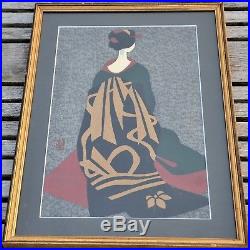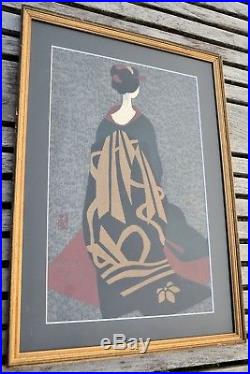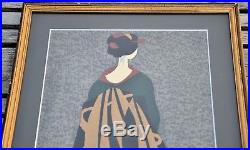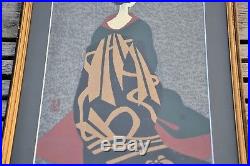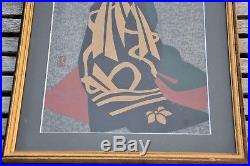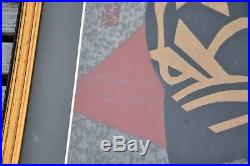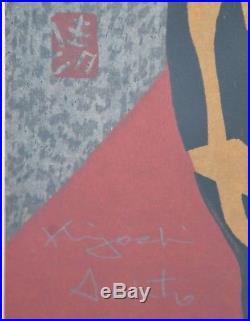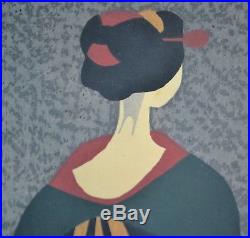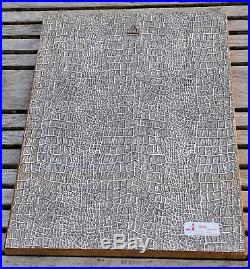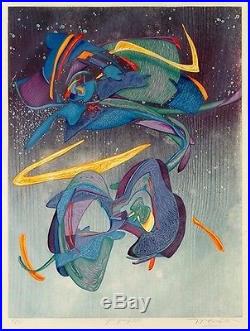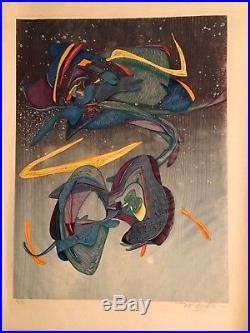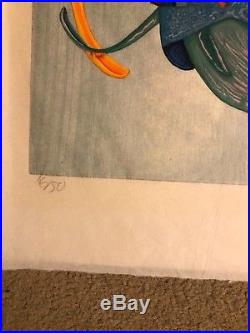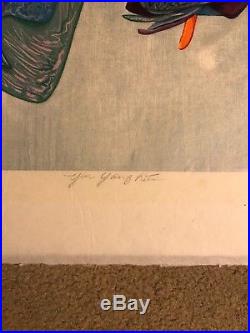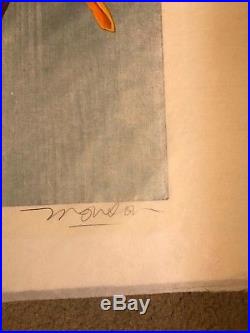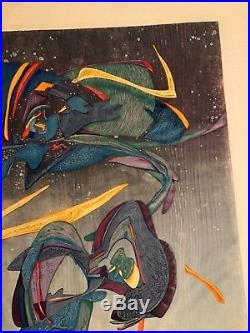Archive for the ‘ color ’ Category
Two Color Linocut Printmaking By Maarit H Nninen
Author: adminNov 26
Color woodblock print Saito, Kiyoshi Japan ca 1965
Author: adminJul 1
Dimensions: 15.5 x 10.1 inches. Description: A signature Soetsu Hanga woodblock by Saito. Signature: pencil signed lower left. Frame Type: red with Asian style decoration. Frame Size: 19 x 13,5 inches. In good condition, some minor damage to the wooden frame. The small spots are on the inside of the glass, not on the print itself. The colors are actually more vibrant then can be seen on the pictures. The print is absolutely not faded. The item “Color woodblock print Saito, Kiyoshi Japan ca 1965″ is in sale since Friday, June 29, 2018. This item is in the category “Collectibles\Cultures & Ethnicities\Asian\1900-Now\Japanese\Prints, Paintings & Posters”. The seller is “vankampenantiques” and is located in Groeningen. This item can be shipped worldwide.
- Country/Region of Manufacture: Japan
Color Woodblock Japanese paper Jim Monson Yin Yang Kite Proof 16/50 Large piece
Author: adminFeb 16
Yin Yang Kite 1982 by American/French Artist. Original Wood block multicolored print signed and numbered by the artist. Large 29 3/4″ x 24 1/4″. 16/50 of 50 proofs. Jim Monson was born in Minneapolis, Minnesota in 1943. He received his BA diploma from St. Olaf College, where he took painting courses from John Maakestad. « John Maakestad his first mentor and friend, who encouraged him to explore and express himself with art. Then in 1965 he continued his studies at the University of Iowa, where he continued painting under Byron Burford, but began to major in printmaking under the direction of Mauricio Lasansky, often considered one of the outstanding American print teachers of the 20th century. « Lasansky opened-up a whole new world of prints and a passion for the medium. Mauricio LasanskyStanley William Hayter. Diplomas in hand (1969), he decided to go to Paris and continue his work with Stanley William Hayter at the well-known Atelier 17. « Paris formed me and gave me my first concept of a professional life, my myths, essential subjects, my sensitivities and in brief, my pictorial philosophy. Founded n 1927, Atelier 17 became an international focal point for print innovation. Hayters introductory approach to prints was a complete departure from what I had learned from Lasansky. This was a new strong emphasis on abstract composition and working the metal plate in relief for a new direction in color printing. Here he met the German artist Isolde Baumgart, who would become his wife and her close friends Roger Platiel, Hector Saunier, Gail Singer, the Korean artist K. Hwang and many others. « Monsons prints offer a realm of unknown experiences. His world, expressed through the abstract, is obviously a world of imagination, fed more by the experiences of life in general than a specific subject or object. His work is without any presumption and corresponds more to a resonance in ones imagination. After his first year in Paris, Jim Monson rented a house with studio and equipped with a Le Deuil press that was not far from Atelier 17, where he continued his work. Here he printed his own editions as well as for other artists (Georges Hugnet, Matthew Spender, Yasuyuki Kihara, Joëlle Serve and George Ball). In the Fall of 1973, Jim Monson accepted a position replacing Warrington Colescott at the University of Wisconsin in Madison. Among his memorable students were Bret Wilson, Susan Gosin and Joann Moser, who wrote her doctoral thesis on the global influence of Hayter and Atelier 17. A few years later she was to become the head curator for prints at the Museum of American Art in Washington D. « While at the university he made several photo-etchings, combining drawn images with a relief intaglio plate. Jim and students in College of the Holy Cross of Worcester in 1982. Jim Monson began a print workshop in the south of France near Tourrette-Levens, where he would invite friends from Atelier 17 to spend the summers. He was also invited as artist in residence at the Tyler School of Art in Rome. In 1976 he was appointed to a joint professorship at Carleton College and St. Olaf College (Northfield, MN). From 1977 to 1982 he was an assistant professor of prints and drawings at the College of the Holy Cross in Worcester, Massachusetts and in 1981 he participated in a print symposium with Garo Antreasian at the University of Massachusetts in Amherst. In 1984 his wife Isolde Baumgart accepted a teaching position at the Merz Academy in Stuttgart. The couple spent much of their time between Frankfurt, Stuttgart and the South of France. Although etchings and engravings dominate his early work, Monson is now known more for his color woodcuts, which has been his passion for more than thirty years. What could be more simplistic than working by the principle that what is cut away from the surface matrix no longer effects the printed image. But eliminating complexity of technique still demands a laborious procedure; a trade-off that he considered worthwhile since none of the subtleties in cutting are lost in the process and the resulting colors are much more vibrant since a red is composed of a gradual build-up of the preceding yellows and oranges. He stumbled onto this manner of printing by observing Picassos simplistic approach to creating his linoleum prints. This was a progressive cutting away of a single matrix for each color. Initially Monson used two wood blocks; the first represented an independent background and the second block was used to develop the objects, which also creates a spatial reality. Using one or two blocks was still a more economical method of printing than the traditional method of using one block for each color. The development of the composition, working from a predetermined color solution, is produced by the progressive elimination of areas on the matrix once their desired effect has been achieved. This means that the quantity of the edition must also be predetermined and that each nuance of color must be printed on the entire edition before the matrix is modified and progressively destroyed. The item “Color Woodblock Japanese paper Jim Monson Yin Yang Kite Proof 16/50 Large piece” is in sale since Saturday, July 01, 2017. This item is in the category “Art\Art Prints”. The seller is “fancyartsandantiques” and is located in Martinsburg, West Virginia. This item can be shipped worldwide.
- Date of Creation: 1982
- Listed By: Dealer or Reseller
- Subject: Abstract
- Original/Reproduction: Original Print
- Style: Impressionism
- Artist: JIm Monson
- Print Surface: Japan Paper
- Medium: Woodcut & Block
- Color: Multi-Color
- Size: Medium (up to 36in.)
- Year: 1982
- Features: Signed
